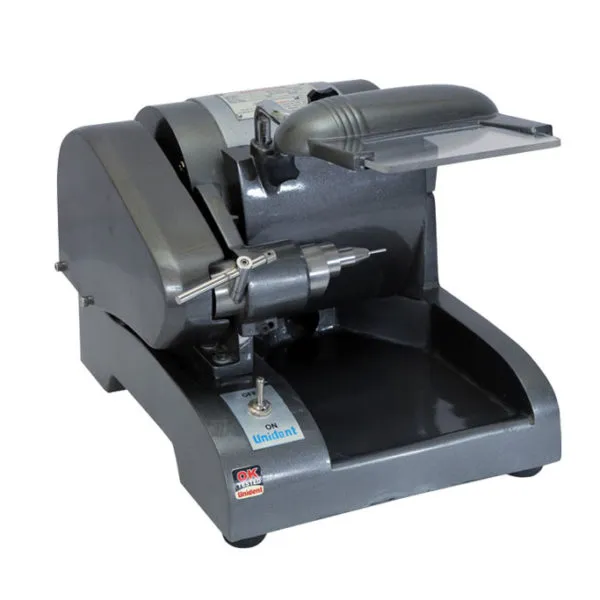The Dental Alloy Grinders category features essential lab equipment designed for grinding, shaping, and polishing dental alloys with precision and efficiency. These grinders are indispensable in dental laboratories for finishing cast frameworks, trimming excess material, and refining metal prostheses such as crowns, bridges, and partial denture components.
Reliable grinding tools are key to ensuring the proper fit, function, and aesthetics of fixed and removable restorations. By offering speed, control, and durability, alloy grinders help lab technicians deliver high-quality results consistently, even under demanding workloads.
Importance of Dental Alloy Grinders in Dental Labs
Dental alloy grinders play a crucial role in prosthetic workflows. Their importance includes:
- Precision Adjustments: Allowing fine-tuning of cast frameworks to fit the patient’s unique oral anatomy.
- Material Shaping: Used for contouring alloy components for optimal retention and comfort.
- Efficient Sprue Removal: Quickly detaching sprues without damaging the main structure.
- Surface Finishing: Smoothing rough surfaces before final polishing or porcelain layering.
Without a reliable alloy grinder, technicians face time-consuming manual work and a higher risk of inaccuracy.
Product Range and Variants
This category includes a variety of models to match the needs of both small labs and high-volume production centers:
- Single- and Dual-Speed Grinders – Offering flexibility for various tasks, from heavy grinding to delicate finishing.
- Integrated Dust Extraction Units – Maintaining clean, safe environments by collecting alloy dust.
- Compact Bench-Top Units – Ideal for labs with limited space, without compromising on power or performance.
- Heavy-Duty Models – Designed for long-term use with higher torque motors and robust construction.
Technicians can choose grinders based on power requirements, task load, and lab setup.
Key Features and Advantages
- High-Speed Performance: Efficient material removal shortens production time.
- Durable Build: Alloy grinders are designed for heavy use and long service life.
- Ergonomic Design: Comfortable handling and easy-to-reach controls enhance usability.
- Safety Measures: Many models include protective shields and ventilation options.
- Versatile Compatibility: Suitable for chrome-cobalt, nickel-chromium, and other common dental alloys.
These grinders help maintain consistency and reduce errors across multiple cases.
Clinical and Laboratory Applications
Although not used chairside, alloy grinders are vital for lab-based processes related to:
- Crown and Bridge Framework Adjustment
- Partial Denture Framework Finishing
- Orthodontic Appliance Trimming
- Metal Base Polishing for Hybrid Dentures
- Casting Preparation and Sprue Detachment
Their use ensures restorations not only fit well but are also functionally and aesthetically superior.
Maintenance and Best Practices
Proper maintenance ensures longevity and smooth operation:
- Clean After Each Use: Remove debris to prevent clogging and overheating.
- Inspect Wheels and Burrs Regularly: Replace worn tools to maintain efficiency.
- Avoid Overloading: Operate within recommended capacity to preserve motor health.
- Use Appropriate PPE: Always wear safety glasses and a mask to avoid metal dust exposure.
- Ensure Stable Setup: Secure the unit on a firm bench to prevent vibration and shifting.
Routine care reduces downtime and extends the equipment’s functional life.
FAQs – Dental Alloy Grinders
- What type of alloys can be processed with dental alloy grinders?
These grinders are compatible with most dental casting alloys, including nickel-chromium, cobalt-chromium, and titanium-based materials.
- Do I need a dust collector with my alloy grinder?
While not mandatory, a dust collector is highly recommended for maintaining air quality and preventing respiratory hazards in the lab.
- Can alloy grinders be used on non-metallic materials?
Some models allow limited use on acrylic and resin, but specific burrs and speed adjustments are needed for best results.
- How long does an alloy grinder typically last?
With proper maintenance, a good-quality dental alloy grinder can last 5–10 years or more, depending on usage frequency.
- What safety precautions should be followed when using alloy grinders?
Always use eye protection, avoid loose clothing or jewelry, and follow the manufacturer’s safety guidelines for safe and efficient use.

















